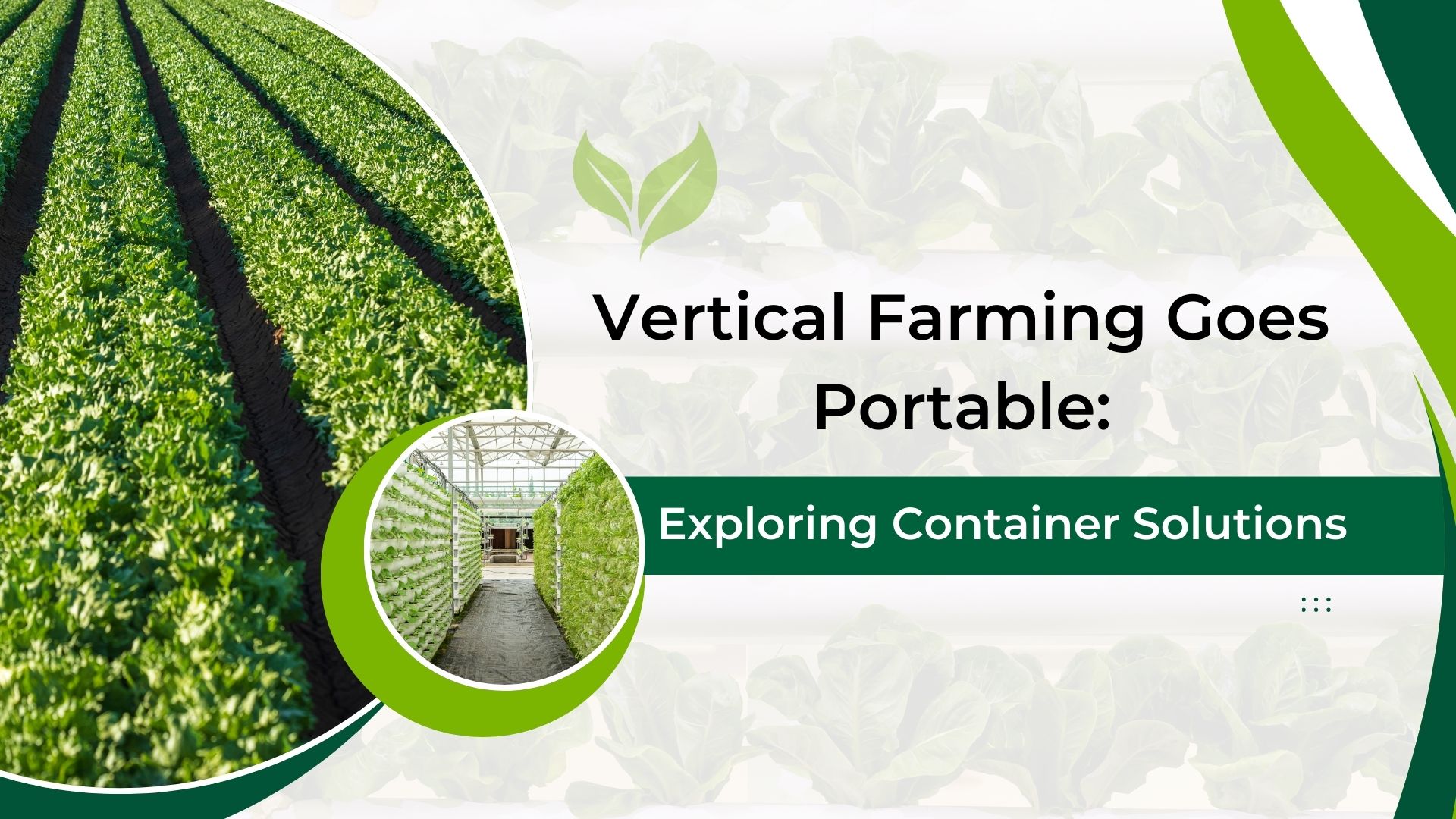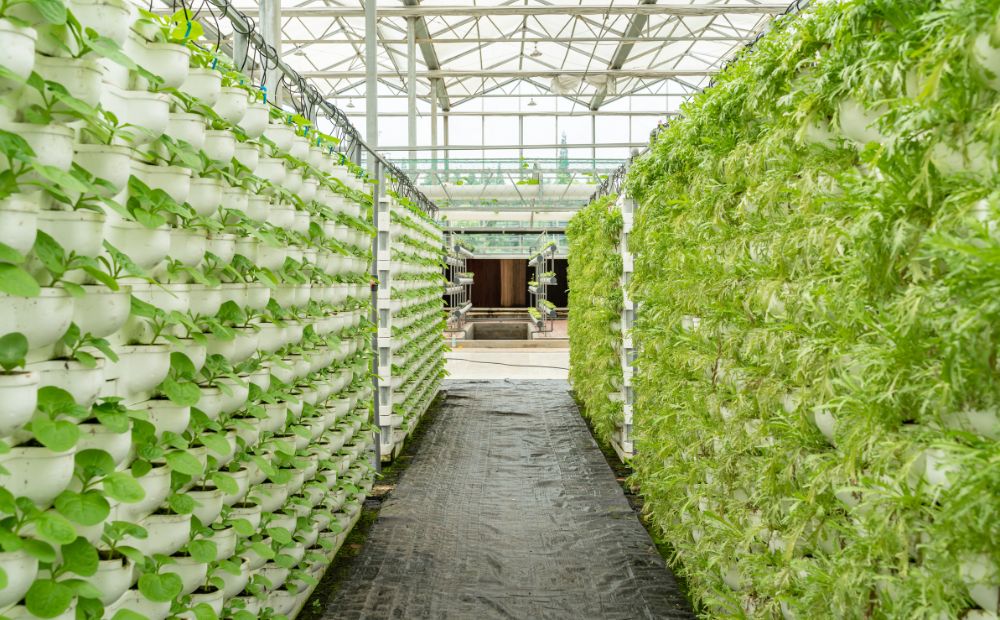
“The vertical farming system is a major step forward in vastly reducing the carbon footprint of delivering fruit and vegetables by road from Europe and in particular air transport from across the world. This project brings a combination of our farming and engineering expertise, ensuring fresh produce without the reliance on favourable weather or suitable soil conditions”
Charles Brunton, Director and Project Manager at Henley Associates Limited
Vertical farming, an innovative approach to agriculture, maximizes space efficiency by growing crops in stacked layers. Recently, this method has taken a mobile turn with the advent of container solutions. These portable farms, housed in shipping containers, offer numerous benefits and applications, revolutionizing how and where we grow food.
Table of Contents

Vertical Farms
A tool to decentralize our Food System. Our food system is largely centralized. Consider the following:
The number of farms has dropped significantly in many countries since the 1930s, and the average meal often travels about 1,500 miles from farm to plate. Despite growing demand for local products, farms continue to disappear. Only about one-third of small farms have a designated successor in the family, as many young people are unwilling to invest in an industry that demands long hours and significant physical effort for minimal financial return. We need a new generation of farmers to supply the local food we seek.
Moreover, a centralized food system poses significant risks:
Widespread foodborne illness outbreaks, shipping interruptions due to natural disasters, and the depletion of our land and natural resources.
Decentralize with Shipping Container Farming
Container farming is a method of indoor, small-space farming that was pioneered by Freight Farms in 2011 with the Leafy Green Machine. Over the past decade, container farming has evolved into a significant subset of the indoor agriculture industry. These farms utilize used or purpose-built 40-foot containers as shells to house hydroponic systems, which can be set up vertically or horizontally. The containers are climate-controlled and use indoor growing lights to replicate sunlight, creating optimal growing conditions year-round.
More than just a technological innovation, container farming represent a viable business model. A single vertical container farming can grow the equivalent of 2.5 acres of produce annually, offering a lucrative opportunity. One farmer can comfortably operate up to three shipping containers. The modular and stackable design of these farms conserves space and can be placed almost anywhere, making it easier to scale a vertical farming business compared to traditional methods.
Container vertical farms utilize modified shipping containers equipped with all the necessary systems for plant growth, including lighting, climate control, and hydroponic or aeroponic systems. These farms can be placed virtually anywhere, from urban rooftops to rural areas, providing fresh produce locally and reducing transportation costs and carbon footprints.
Top 3 Reasons to Choose Container Farming
Hyper-Local Farming:
Located near urban centers, container farming reduce transportation emissions and provide fresh, nutritious produce year-round, supporting local economies and enhancing food security.
Reduced Operating Expenses:
Container farms optimize land use, conserve up to 90% of water, use efficient LED lighting, and require fewer pesticides and labor, leading to lower costs and higher yields.
Shorter Time-to-Market:
Accelerated crop growth and proximity to markets ensure faster delivery of fresh produce, reducing transportation time and costs, and allowing quick response to market demands.
Applications and Innovations
Urban Farming: Container farms are increasingly being used in cities to provide local, fresh produce to urban populations. They can be placed on rooftops, vacant lots, or even within buildings.
Disaster Relief: In disaster-stricken areas, container farms can quickly be deployed to provide immediate food security. Their portability and ease of setup make them ideal for such situations.
Remote Locations: Military bases, arctic stations, and other remote locations can benefit from container farms, ensuring a reliable food supply without the need for constant resupply missions.
Research and Development: Universities and agricultural research centers use container farms for controlled experiments, allowing them to study plant growth in precise conditions.
Challenges and Considerations
While container vertical farms offer numerous advantages, they also come with challenges. Initial setup costs can be high, and technical expertise is required to manage the advanced systems within these farms. Additionally, energy consumption, particularly for lighting and climate control, can be significant, although renewable energy sources can mitigate this issue.
The Future of Container Vertical Farming
The future looks promising for container vertical farming. With advancements in technology, costs are expected to decrease, making this solution more accessible. Integration with smart farming technologies, such as IoT sensors and AI, can further enhance efficiency and productivity. As the demand for sustainable and local food production grows, container vertical farming is poised to play a crucial role in the global agricultural landscape.
Case Study: Madar Farms
Vertical Container Farming in Dubai:
Overview Madar Farms, a pioneering agricultural company based in Dubai, has embraced container vertical farming to address the unique challenges of agriculture in the UAE. Given the region’s harsh climate and limited arable land, Madar Farms utilizes advanced technology to grow fresh produce sustainably and locally.
The Container Farming Solution
Madar Farms employs custom-built shipping containers equipped with state-of-the-art hydroponic systems to cultivate a variety of crops. These containers are designed to operate efficiently in Dubai’s extreme temperatures and water-scarce environment.
Key Features:
Climate Control: Advanced HVAC systems regulate temperature and humidity, creating an optimal environment for plant growth year-round.
LED Lighting: Energy-efficient LED lights simulate natural sunlight, enabling photosynthesis regardless of external weather conditions.
Hydroponic Systems: Soilless cultivation methods use nutrient-rich water, significantly reducing water consumption compared to traditional farming.
Automation and Monitoring: IoT sensors and automated systems monitor and adjust environmental conditions, ensuring consistent and efficient operation.
Implementation and Impact
Urban Agriculture in Dubai
Madar Farms has established several container farms in urban areas across Dubai, supplying fresh produce to local markets, restaurants, and hotels. These urban farms help meet the growing demand for locally sourced, high-quality food while reducing the carbon footprint associated with food transportation.
Case Example: In the bustling Jumeirah JLT farms Lakes Towers vertical farming (JLT) area, Madar Farms operates a container farm that produces leafy greens and herbs. This farm is strategically located to serve nearby residential and commercial communities. The produce is harvested and delivered on the same day, ensuring maximum freshness and nutritional value.
Water scarcity is a critical issue in the UAE. Madar Farms’ hydroponic systems use up to 90% less water than traditional farming methods. This efficiency is crucial in a region where water conservation is essential for sustainability.
Case Study: UrbanKisaan
Vertical Farming in India
UrbanKisaan, a Hyderabad-based startup, is revolutionizing agriculture in India through vertical farming, including the use of container farms. They focus on growing fresh, pesticide-free produce in urban settings, making farming accessible and sustainable.
The Container Farming Solution
UrbanKisaan’s container farms are equipped with hydroponic systems that allow for efficient, high-density crop cultivation. These farms are designed to be set up in urban areas, providing fresh produce directly to consumers.
UrbanKisaan has established several container farms in Hyderabad, bringing fresh, locally grown produce to the city’s residents. These farms supply a range of vegetables and herbs to local markets and directly to consumers through subscription models.
Case Example – Miyapur Farm: One notable project is their container farm in Miyapur, a suburb of Hyderabad. This farm produces a variety of greens and herbs, which are sold through their online platform and delivered directly to customers’ doorsteps. This model not only ensures fresh produce but also educates consumers about the benefits of locally grown, pesticide-free food.
Sustainability and Resource Efficiency
India faces significant challenges related to water scarcity and agricultural sustainability. UrbanKisaan’s hydroponic systems address these issues by drastically reducing water usage and eliminating the need for harmful pesticides. Their container farms also reduce the carbon footprint associated with transporting produce over long distances.
Future Prospects
UrbanKisaan plans to expand their container farming operations to other major cities in India. Their success in Hyderabad serves as a model for other cities looking to adopt similar practices, showcasing the potential of vertical farming to transform urban agriculture in India.
Exploring Container Farming: Versatile Solutions for Modern Agriculture
With sizes ranging from 20 to 53 feet, the 40-foot container farm is the most popular choice, offering an ideal balance of space and versatility. These repurposed shipping containers enable year-round cultivation regardless of location or weather conditions and now come with a lifetime warranty.
Starter Farm
Universal Lite Farm: Ideal for beginners, allowing you to install your own agricultural equipment.
Farm Expansion
Nursery Container Farm: Perfect for starting seeds and clones, offering propagation services.
Community Farms
4-IN-1 Hydroponic Container Farm: Grow popular leafy greens like lettuce and bok choy.
Mushroom Container Farm: Cultivate gourmet mushrooms like Lion’s Mane and oysters.
Microgreens Container Farm: Enter the microgreens market quickly.
Strawberry Container Farm: Grow ever-bearing or day-neutral strawberries year-round.
Commercial Farms
Herbs Container Farm: Grow popular herbs like basil and oregano.
Hemp Container Farm: Grow industrial hemp up to six times a year in a bio-secure environment.
Fodder Container Farm: Produce highly nutritious livestock feed for dairy farms.
Institutional Farms
Research Container Farm: Conduct experiments and validate hypotheses in research facilities.
Educational Container Farm: Teach the next generation of Controlled Environment Agriculture (CEA) growers.Container farms offer a sustainable and efficient way to meet agricultural needs in various contexts, from startups to community projects and institutional research. Their versatility and ability to produce fresh produce year-round make them an excellent choice for modern farming.
Conclusion
container vertical farming represents a flexible, sustainable, and efficient approach to modern agriculture. Its portability and ability to provide fresh produce in diverse environments make it a valuable innovation in the quest for food security and sustainability.
Signup For AgriNext Conference Newsletter


